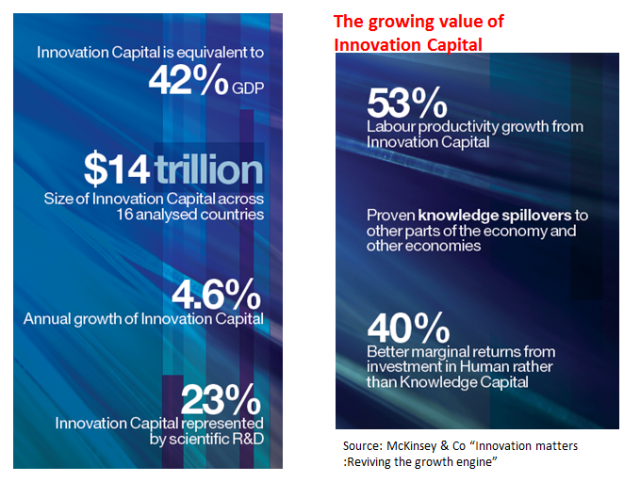 Recognizing the value of our innovation-related assets is where the ‘smart money’ should go. To gain growth and to improve productivity is through innovation. We need to translate knowledge into new values.
Recognizing the value of our innovation-related assets is where the ‘smart money’ should go. To gain growth and to improve productivity is through innovation. We need to translate knowledge into new values.
When you pause and consider the make-up of Innovation Capital you realize it makes such an economic contribution and in a report from McKinsey & Co, they have set about identifying this to produce the above summary visual. They surveyed 16 countries to understand the real value of this Innovation Capital.
In the report from McKinsey and Co, called “Innovation matters: Reviving the growth engine” and first presented at the G8 leaders Innovation Conference, in London on 14 June 2013, the report quantifies the importance of innovation in driving productivity growth and sets out the actions that governments and societies can take to build “Innovation Capital.”
These numbers are big and still don’t fully capture everything associated with innovation as much remains ‘hidden’ or ‘attached’ or 'accounted for' in other associated activities as well.
In this report they considered the broader aspects of Innovation Capital capturing software, design, market research, training and new business processes as well as spending by governments and through tertiary education in science, technology, engineering and mathematics (STEM) subjects.
My questions here in this community: Are you surprised by these numbers, think the approach taken has 'going forward' value and does this shift the capital debate?
Comments
I'm sorry if you felt swatted down! I can't help picking apart these ideas.
I completely agree that we want to help connect the dots with various approaches including IIRC, accounting, innovation, human capital, IT, IP and much more. I often tell people that what unites all of us is the desire to connect the dots. We all have deeper experience in one area or another but we all understand the importance of holistic thinking.
You ask at the end "Do you think this changes the conversation?" The answer lies in the audience listening to this (rehash) from McKinsey, leaders in the G8 community. That prompts deeper conversation.
What McK have also set about deliberately to emphasis is the (sheer) size of this. Numbers as presented would make people sit up and consider.
As for our ability to capture even more within and contributing to organizations IC - it is not easy as we still don't have a IC accounting approach although you are promoting one so quantifying all the intangibles into capital in the way McK and clearly the Conference Board are doing makes those undertaking this research as being forced back to what is 'freely' available. We may 'sniff' at this, the same as IIRC and their lack of real guidance and until we change this, we have to live with this more limited view.....but it is still big numbers........just imagine if we could finally 'nail' down all that makes up IC- wow!
I'm equally picking up on your wish to stretch outside the internal view. Surely if we don't know what goes on in our own back gardens, stepping beyond just makes it more of a puzzle to solve. So if the conversation does go back in to achieve that self-analysis and realization so be it- it is still needed.
You have commented upon the ability to link into other communities of interest- those in accounting, those in knowledge management yet these 'treaties' are rejected. For me this is where the stretching should all take place, so we all begin to see the same page and work towards applying our collective thinking to what is on that page.
Until then we remain in KM, Innovation, Intangibles, Intellectual deplete, in changing the conversation, in gaining the attention, in shifting views.
I'd rather be in the type of conversations that McK and IIRC are having with governments, and business leaders and support them in the ways I can, working on the more voices that talk about 'this' in ways of ongoing progress the better for the long term. I just wish I was a 'talking fly' on the wall to fire up imaginations and possibilities just that little bit more. Then again, I expect I'd be swatted!
Paul - When I look at the data they use, it's primarily from the research on intangible capital by The Conference Board and related researchers. They've added a physical component to account for the computers themselves (we tend to focus more on what's inside the computers.So, to a great degree, this is nothing new, just a re-branding of something we've all been talking about for years.
What they have minimized is relationship capital. The only component they have is "brand equity" under "knowledge capital." This means that their view is an inside-out one, just focusing on the company itself as separate from its business, social and environmental ecosystems.
I'm always happy to have more voices talking about let's call it "IC." And innovation is a lot easier to like than the word intangible. But just as we as a community have been trying to stretch and involve a more integrated perspective, McKinsey is moving the conversation back into an internal view.
One other issue is that, for better or worse, the word intangible keeps the conversation open with the accounting world. Although I had written this conversation off a long time ago, I am hearing increasing interest in connecting what we do with accounting (using approaches such as the World Bank study on Chilean vineyards' investment in intangibles)
So for me the big question is not about the numbers. It's about the wording we use.
Do you think this changes the conversation?